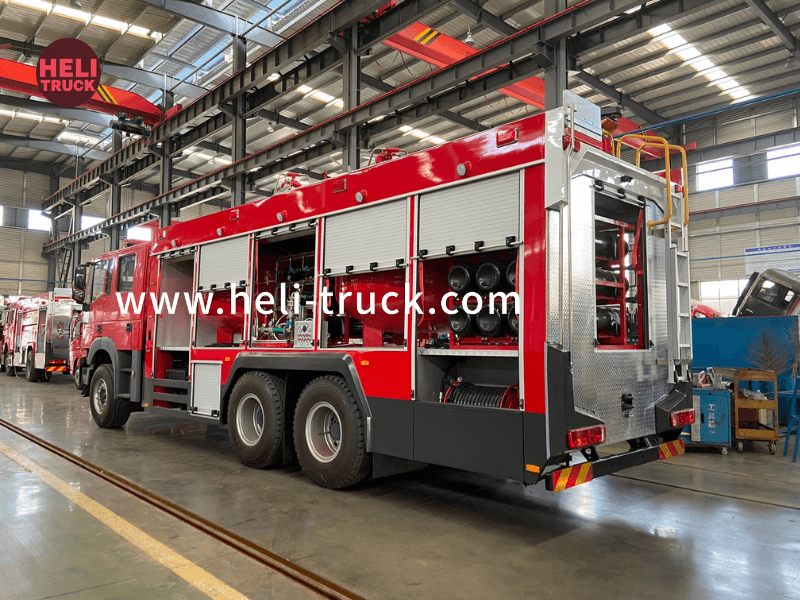Maximizing Waste Minimization Through Garbage Compactor Trucks
Introduction In today's world, waste management has become a critical issue as the global population continues to grow, leading to an increase in waste generation. Proper waste disposal is essential to protect the environment and public health. One of the key tools in waste minimization and management is the garbage compactor truck. These specialized vehicles play a crucial role in collecting, compacting, and transporting waste efficiently. This article will explore the importance of garbage compactor trucks in waste minimization efforts, their functionality, benefits, and impact on the environment. Understanding Garbage Compactor Trucks Garbage compactor trucks, also known as compactors or trash compactors, are specialized vehicles designed to collect and compact solid waste. These vehicles are commonly used by waste management companies, municipalities, and other organizations responsible for waste collection and disposal. Garbage compactor trucks come in various sizes and configurations, ranging from small, rear-loading compactors to large, front-loading and side-loading compactors for commercial and industrial use. Functionality of Garbage Compactor Trucks Garbage compactor trucks operate on a simple yet effective principle. The trucks are equipped with a hydraulic compactor system that compresses the collected waste, reducing its volume and increasing the truck's capacity to hold more waste. This compaction process helps to maximize the efficiency of waste collection and transportation, reducing the number of trips required to empty the truck. The compactor system typically consists of a large metal blade or ram that compresses the waste against the back of the truck's storage compartment. Once https://www.heli-truck.com/aerial-platform-truck/ is compacted, the truck's hydraulic system ejects the compacted waste into the storage compartment, allowing the truck to continue collecting more waste. This process is repeated until the truck reaches its maximum capacity, at which point it is transported to a waste disposal site for unloading. Benefits of Garbage Compactor Trucks Garbage compactor trucks offer a wide range of benefits for waste management and minimization efforts. Some of the key advantages of using compactor trucks include: 1. Increased Efficiency: Garbage compactor trucks can collect and transport a larger volume of waste compared to traditional waste collection vehicles. The compaction process reduces the volume of waste, allowing more waste to be collected on each trip, thereby increasing operational efficiency. 2. Reduced Labor Costs: By maximizing the amount of waste that can be collected in a single trip, garbage compactor trucks help reduce the labor costs associated with waste collection. Fewer trips are required to empty the truck, saving time and resources. 3. Improved Hygiene and Safety: Garbage compactor trucks are designed to contain and compact waste securely, minimizing the risk of spillage and reducing odors. This helps to maintain a cleaner and more hygienic environment for both the waste collection crew and the public. 4. Environmental Benefits: The compaction of waste reduces the volume of landfill space required for waste disposal, helping to conserve valuable land resources. Additionally, compacted waste is less likely to attract pests and vermin, reducing the risk of environmental contamination. 5. Cost Savings: Garbage compactor trucks can lead to significant cost savings for waste management companies and municipalities. The increased efficiency and reduced labor costs associated with compactor trucks can help organizations optimize their waste management operations and allocate resources more effectively. Impact on Waste Minimization Garbage compactor trucks play a crucial role in waste minimization efforts by enabling more efficient waste collection and transportation. By compacting waste and maximizing the truck's capacity, compactor trucks help reduce the number of trips required to empty the truck, leading to lower fuel consumption and reduced carbon emissions. This results in a more sustainable waste management process that minimizes the environmental impact of waste disposal. Furthermore, the use of garbage compactor trucks can help promote recycling and waste segregation initiatives. By providing dedicated compartments for different types of waste, compactor trucks make it easier to separate recyclable materials from general waste, facilitating the recycling process and diverting waste from landfills. This contributes to a more sustainable waste management system that prioritizes waste minimization and resource conservation. In addition to waste minimization, garbage compactor trucks also play a vital role in waste compaction and landfill management. By compacting waste before disposal, compactor trucks help optimize landfill space utilization, extending the lifespan of landfills and reducing the need for new disposal sites. This is particularly important in urban areas where land for waste disposal is limited, highlighting the importance of efficient waste compaction in maximizing waste minimization efforts.  Conclusion Garbage compactor trucks are indispensable tools in waste minimization and management, offering a range of benefits that contribute to a more sustainable and efficient waste management system. By compacting waste, increasing operational efficiency, and promoting recycling initiatives, compactor trucks help minimize the environmental impact of waste disposal and optimize resource utilization. As the global population continues to grow, the role of garbage compactor trucks in waste minimization efforts will become increasingly important in creating a cleaner, healthier, and more sustainable environment for future generations.
Conclusion Garbage compactor trucks are indispensable tools in waste minimization and management, offering a range of benefits that contribute to a more sustainable and efficient waste management system. By compacting waste, increasing operational efficiency, and promoting recycling initiatives, compactor trucks help minimize the environmental impact of waste disposal and optimize resource utilization. As the global population continues to grow, the role of garbage compactor trucks in waste minimization efforts will become increasingly important in creating a cleaner, healthier, and more sustainable environment for future generations.